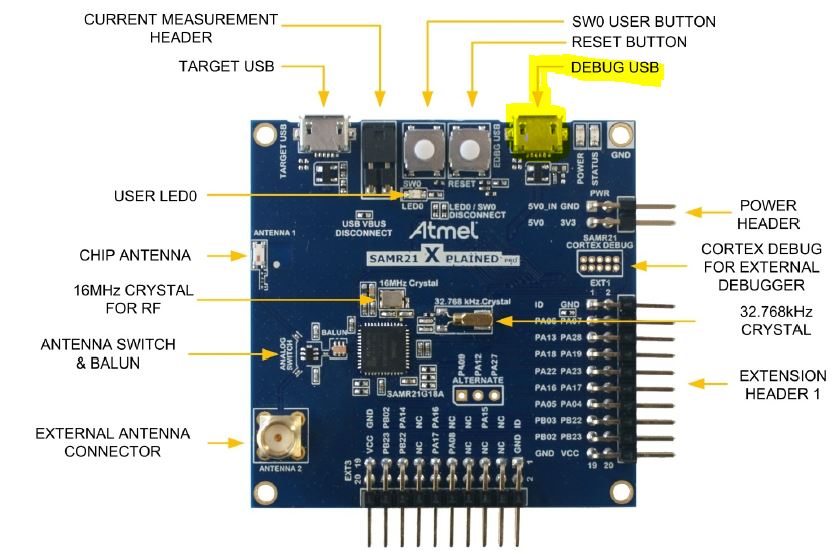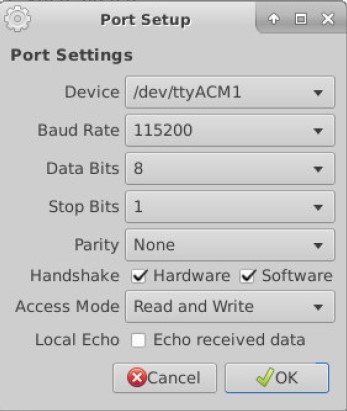Riot-OS Setup
Summary
Setting up Riot-OS on a Atmel SAM R21 Xpro Board.
Requirements
- Operating system: Ubuntu 20.04
- Packages: git
Description
Step 1
Install the following packages
sudo apt-get update
sudo apt-get install git
openocd
gcc-multilib
build-essential
python3-serial
libudev-dev
moserial
Step 2
Install the toolchain
sudo apt-get install gcc-arm-none-eabi
If you use a recent version of RIOT-OS (Release-2021.07) you can go on with Step 3.
If you use an older RIOT-OS version, you will have to do the following steps:
Goto https://developer.arm.com/tools-and-software/open-source-software/developer-tools/gnu-toolchain/gnu-rm and download
gcc-arm-none-eabi-7-2018-q2-update-linux.tar.bz2
Move it to your home directory.
Uninstall old packages
sudo apt remove binutils-arm-none-eabi gcc-arm-none-eabi libnewlib-arm-none-eabi
Unzip the downloaded file
tar -xjvf gcc-arm-none-eabi-7-2018-q2-update-linux.tar.bz2
Add the toolchain to your path
export PATH=$PATH:/home/(your user)/gcc-arm-none-eabi-7-2018-q2-update/bin/
For now: you will have to do this in the bash where you build your application - after each restart.
Add toolchain permanently to PATH (otherwise it's necessary to do it manually after every restart):
vim ~/.profile
and/or
vim ~/.bashrc
Add the following line to the bottom and save (adapt to your used ARM toolchain!):
export PATH=$PATH:<path to unzipped folder>/gcc-arm-none-eabi-9-2020-q2-update/bin
Apply changes for current shell:
source ~/.profile source ~/.bashrc
Step 3
Download Riot-OS
git clone https://github.com/RIOT-OS/RIOT.git myRIOT
Move to the "Hello World"-Example
cd myRIOT/examples/hello-world
Build the application on "native"
make all term
Now, you should see this output in your terminal:
RIOT native interrupts/signals initialized. LED_RED_OFF LED_GREEN_ON RIOT native board initialized. RIOT native hardware initialization complete. main(): This is RIOT! (Version: 2022.01-devel-129-g554d3) Hello World! You are running RIOT on a(n) native board. This board features a(n) native MCU.
Step 4
Build and run "Hello World" on the SAM R21 Board.
Set the rights for your username to be able to flash the application on the board.
sudo usermod -a -G dialout <username>
Then reboot your computer.
Connect the board to your computer via micro USB cable (USB EDBG interface).
Connect via Moserial.
Build and flash the application.
cd myRIOT/examples/hello-world make BOARD=samr21-xpro make BOARD=samr21-xpro flash
If you do not use a serial terminal like moserial or terraterm use term
make BOARD=samr21-xpro term
Or via pyterm (which is shipped with RIOT-OS):
sudo pip3 install pyserial cd RIOT/dist/tools/pyterm ./pyterm -p /dev/ttyACM0
You may also set the BOARD in the Makefile of the application.
To find out the correct tty when multiple (SAMR21-xpro) boards are connected to your system:
$ cd RIOT/examples/hello-world $ make list-ttys /sys/bus/usb/devices/1-3: Atmel Corp. EDBG CMSIS-DAP, serial: 'ATMLXXXXXXX80000XXX1', tty(s): ttyACM0 /sys/bus/usb/devices/1-2: Atmel Corp. EDBG CMSIS-DAP, serial: 'ATMLXXXXXXX80000XXX2', tty(s): ttyACM1
If you have multiple boards connected to your computer it is necessary to provide the serial during flashing:
BOARD=samr21-xpro SERIAL="ATMLXXXXXXX80000XXX1" make flash
Used Hardware
Courses
- Mobile and Embedded Security (2019-)
RIOT More Information/Resources/Links
- Wiki: RIOT-OS and IEEE 802.15.4 / 6LoWPAN
- Wiki: Raspberry Pi 3B+ 802.15.4/6LoWPAN Setup
- Paper (optional): Baccelli, Emmanuel, et al. _"RIOT: An open source operating system for low-end embedded devices in the IoT."_ IEEE Internet of Things Journal 5.6 (2018): 4428-4440.
- Riot-OS Setup (ELVIS Wiki): https://wiki.elvis.science/index.php?title=Riot-OS_Setup
- RIOT-OS+SAMR21 Setup (CoMatrix): https://comatrix.eu/setup/samr21_and_RIOT-OS/
- RIOT-OS Github repository: https://github.com/RIOT-OS/RIOT
- Getting Started: https://doc.riot-os.org/getting-started.html
- Introduction: https://github.com/RIOT-OS/RIOT/wiki/Introduction
- Changelog/Release Notes: https://doc.riot-os.org/changelog.html
- Use Docker to build RIOT:
- API documentation: https://doc.riot-os.org/
- Wiki: https://github.com/RIOT-OS/RIOT/wiki
- FAQ: https://github.com/RIOT-OS/RIOT/wiki/FAQ
- Best Practice for RIOT Programming: https://github.com/RIOT-OS/RIOT/wiki/Best-Practice-for-RIOT-Programming
- Tutorials: https://github.com/RIOT-OS/Tutorials
- RIOT online course: https://github.com/RIOT-OS/riot-course
- RIOT Beginner Tutorial - RIOT Summit 2021: https://riot-os.github.io/riot-course/slides/tutorial-summit-networking/
- Networking in RIOT: https://riot-os.github.io/riot-course/slides/04-networking-in-riot/
- RIOT Tutorial - IoT Security with Microcontrollers: https://riot-os.github.io/riot-course/slides/tutorial-summit-security
- Forum: https://forum.riot-os.org/
- Matrix Channel: https://matrix.to/#/#riot-os:matrix.org
- ... and slides from Silvie
- pyterm is an alternative to Moserial
- i.e. implicit use with
make BOARD=samr21-xpro term
- i.e. implicit use with
make list-ttys: returns the list of serial ports available with information on the board connected (useful when working with multiple boards)- afterwards e.g.
make term SERIAL="1232135328821"`
- afterwards e.g.
make debug- Remember that the examples directory is very helpful - as well as the test directories :)

